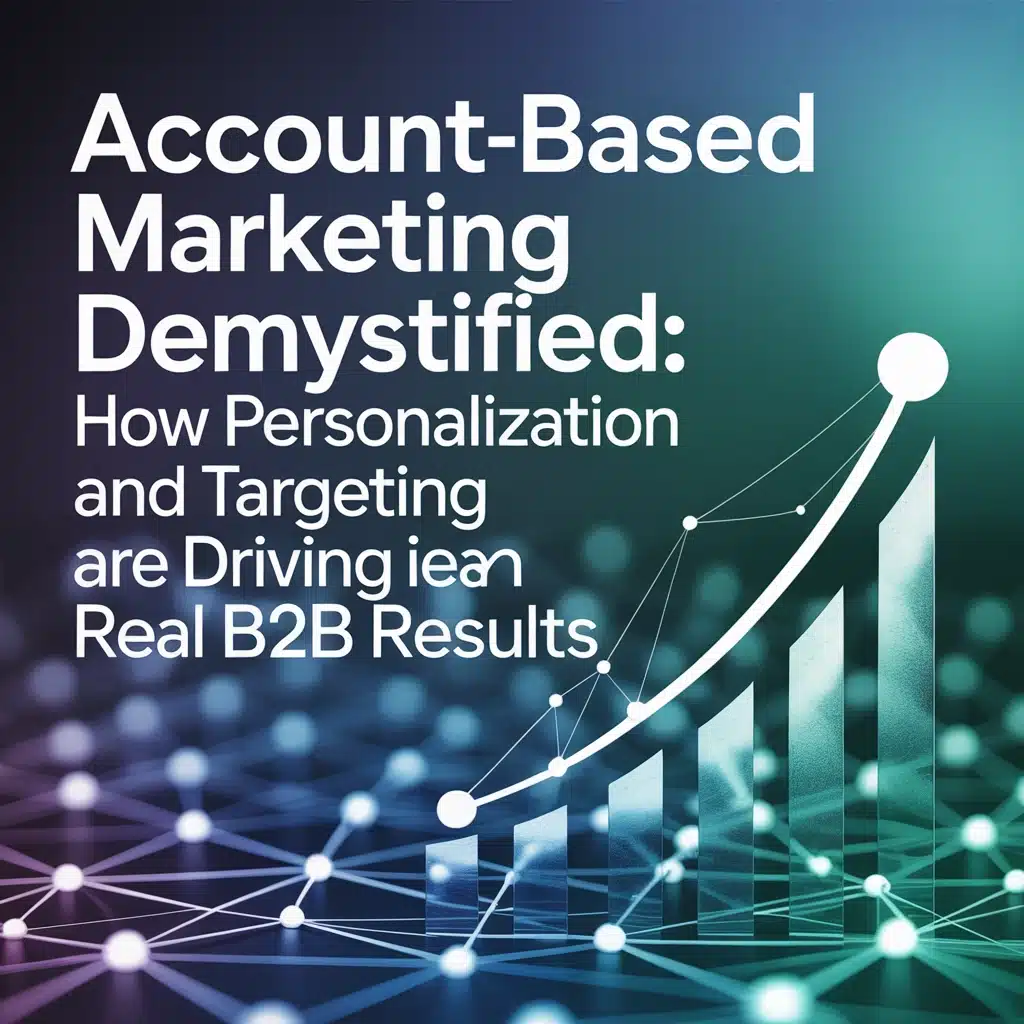What Is Account-Based Marketing?
Account-Based Marketing (ABM) is a focused B2B marketing strategy that treats high-value accounts as individual markets. Instead of trying to appeal to the masses, teams identify best-fit organizations and design campaigns around them. This means marketing and sales work together to pinpoint which businesses they want to engage, using tailored marketing, outreach, and education for each target. ABM flips the old approach upside down. Instead of starting with a broad campaign and hoping the right people find you, you start with a shortlist of companies you know you want to reach. Then, you nurture those accounts with content, events, and resources that speak directly to their needs, goals, and challenges.

How Personalization Works in ABM
The power of ABM isn’t just about who you target. It’s about how you talk to them. Personalization sits at the center of the ABM approach. Teams gather data about key accounts, from public info like press releases and social channels to insights gained during the nurture process. They build Ideal Customer Profiles (ICPs), understand each account’s structure and buying process, and identify what drives their priorities.
Armed with these insights, marketers can:
- Develop custom content—like case studies or whitepapers—tailored to each account
- Personalize email sequences and event invitations
- Reference account-specific challenges and industry trends in communications
- Provide relevant thought leadership from subject matter experts
This level of customization shows each account that you understand their world. It transforms generic outreach into useful, relevant communication.
Why ABM Outperforms Traditional B2B Marketing
Focus Brings Results
Most B2B buying journeys are complex. Multiple stakeholders, longer decision cycles, and big investments make it hard for generic campaigns to land. ABM thrives in these environments because it centers on the needs of a few strategic accounts, making it easier to cut through the noise and build meaningful relationships.
Personalized ABM campaigns speak directly to a prospect’s priorities, which increases engagement and trust. According to recent research, nearly three-fourths of consumers want personalized interactions, and most buyers get frustrated when they don’t feel understood. In B2B, when stakeholders believe your outreach is created just for them, they’re significantly more open to working with your team.
Measurable Return on Investment
It’s no surprise ABM has gained momentum in recent years. By focusing energy and spending on high-value accounts, you avoid wasted effort. Marketers and sales teams can track engagement at the account level, making it easy to see which messages and touchpoints move prospects closer to qualified lead status.
Benefits often include:
- Higher marketing-qualified lead rates
- Faster movement through the pipeline
- Reduced acquisition costs per account
- Higher lifetime value and retention
In short, ABM helps your team put resources where they matter most, streamlining the marketing process and delivering stronger results.

Building Education and Trust: How ABM Nurtures Meaningful Relationships
When ABM works best, it’s because teams focus on building trust and educating their target accounts rather than pushing for a hard sell. The goal shifts from “How do I get a quick win?” to “How do I help this company solve real problems?”
Ways ABM fosters education and trust for MQL success:
- Sharing relevant insights about changes in their industry
- Hosting webinars and inviting key stakeholders from targeted accounts
- Delivering personalized resources, such as benchmarking studies or ROI calculators
- Offering customer stories that show how similar businesses addressed challenges
Instead of pitching, ABM is about guiding. The idea is to be known as a valuable resource—making it easy for decision-makers to trust your team and progress in the buyer journey.
Aligning Sales and Marketing for Consistent Customer Experiences
Traditional B2B marketing and sales teams have often worked in different lanes. With ABM, these silos come down. Both departments have shared ownership of outcomes, collaborating closely to ensure that messaging, timing, and outreach are consistent from first touch to long-term relationship.
Sales can provide critical feedback on what resonates most with accounts, while marketing ensures communications stay customized and relevant. Data and insights flow both ways. This coordination leads to better qualified leads, smoother hand-offs between teams, and a more seamless experience for the prospect.
Research points out that nearly 90% of sales and marketing leaders believe close collaboration is essential for business growth. ABM gives structure to this partnership, making success a team effort rather than a handoff from one group to another.

Customer Journey Improvements and Real Results
B2B buyers often face lengthy and complicated buying journeys. With ABM, every stage of the process is tailored, making those journeys less confusing and more straightforward for accounts your team values most.
Personalized experiences help prospects:
- Navigate internal buying committees
- Overcome unique objections
- Visualize the solution with their specific scenario in mind
When a target account receives consistent, account-specific messages at every stage, they feel more confident and informed. They’re more likely to trust your brand, engage with your content, and eventually become qualified leads.
Adoption and the ABM Trend
The market is leaning into ABM, with more than half of B2B companies rolling out their first ABM initiatives this year. The strategy has proven especially effective for companies selling into large organizations or long buying cycles.
What’s next for ABM? Expect deeper use of data tools to enhance personalization, tighter integrations of educational content, and an even greater emphasis on nurturing, not pushing, prospects through marketing pipelines. As the strategy matures, the winners will be the brands that build the most authentic, trust-driven relationships with their target accounts.

MEMO Marketing Group and Your Marketing Pipeline
At MEMO Marketing Group, we believe ABM isn’t just another marketing buzzword—it’s a critical shift in how organizations approach high-value relationships. Our strategies focus on nurturing accounts through education, transparency, and relevant resources so that every marketing-qualified lead has what they need to move forward confidently.
Curious about how ABM can fit into your marketing pipeline? Learn more about our approach to B2B growth and relationship-building at MEMO Marketing Group.



